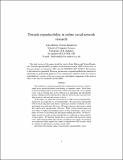Files in this item
Towards reproducibility in online social network research
Item metadata
| dc.contributor.author | Hutton, Luke | |
| dc.contributor.author | Henderson, Tristan | |
| dc.date.accessioned | 2015-08-13T11:40:01Z | |
| dc.date.available | 2015-08-13T11:40:01Z | |
| dc.date.issued | 2018-03 | |
| dc.identifier | 163403775 | |
| dc.identifier | 04b189bd-c896-4d1b-931a-f296eebb808e | |
| dc.identifier | 85043252870 | |
| dc.identifier | 000426707300015 | |
| dc.identifier.citation | Hutton , L & Henderson , T 2018 , ' Towards reproducibility in online social network research ' , IEEE Transactions on Emerging Topics in Computing , vol. 6 , no. 1 , pp. 156-167 . https://doi.org/10.1109/TETC.2015.2458574 | en |
| dc.identifier.issn | 2168-6750 | |
| dc.identifier.other | Bibtex: urn:399b26495c2bd27afc8efcdda3298e9a | |
| dc.identifier.uri | https://hdl.handle.net/10023/7210 | |
| dc.description | This work was supported by the Engineering and Physical Sciences Research Council [grant number EP/J500549/1]. | en |
| dc.description.abstract | The challenge of conducting reproducible computational research is acknowledged across myriad disciplines from biology to computer science. In the latter, research leveraging online social networks (OSNs) must deal with a set of complex issues, such as ensuring data can be collected in an appropriate and reproducible manner. Making research reproducible is difficult, and researchers may need suitable incentives, and tools and systems, to do so. In this paper, we explore the state-of-the-art in OSN research reproducibility, and present an architecture to aid reproducibility. We characterize the reproducible OSN research using three main themes: 1) reporting of methods; 2) availability of code; and 3) sharing of research data. We survey 505 papers and assess the extent to which they achieve these reproducibility objectives. While systems-oriented papers are more likely to explain data-handling aspects of their methodology, social science papers are better at describing their participant-handling procedures. We then examine incentives to make research reproducible, by conducting a citation analysis of these papers. We find that sharing data are associated with increased citation count, while sharing method and code does not appear to be. Finally, we introduce our architecture which supports the conduct of reproducible OSN research, which we evaluate by replicating an existing research study. | |
| dc.format.extent | 12 | |
| dc.format.extent | 396288 | |
| dc.language.iso | eng | |
| dc.relation.ispartof | IEEE Transactions on Emerging Topics in Computing | en |
| dc.subject | Data sharing | en |
| dc.subject | Online social networks | en |
| dc.subject | Reproducibility | en |
| dc.subject | Survey | en |
| dc.subject | QA75 Electronic computers. Computer science | en |
| dc.subject | DAS | en |
| dc.subject | BDC | en |
| dc.subject.lcc | QA75 | en |
| dc.title | Towards reproducibility in online social network research | en |
| dc.type | Journal article | en |
| dc.contributor.institution | University of St Andrews. School of Computer Science | en |
| dc.identifier.doi | https://doi.org/10.1109/TETC.2015.2458574 | |
| dc.description.status | Peer reviewed | en |
This item appears in the following Collection(s)
Items in the St Andrews Research Repository are protected by copyright, with all rights reserved, unless otherwise indicated.

